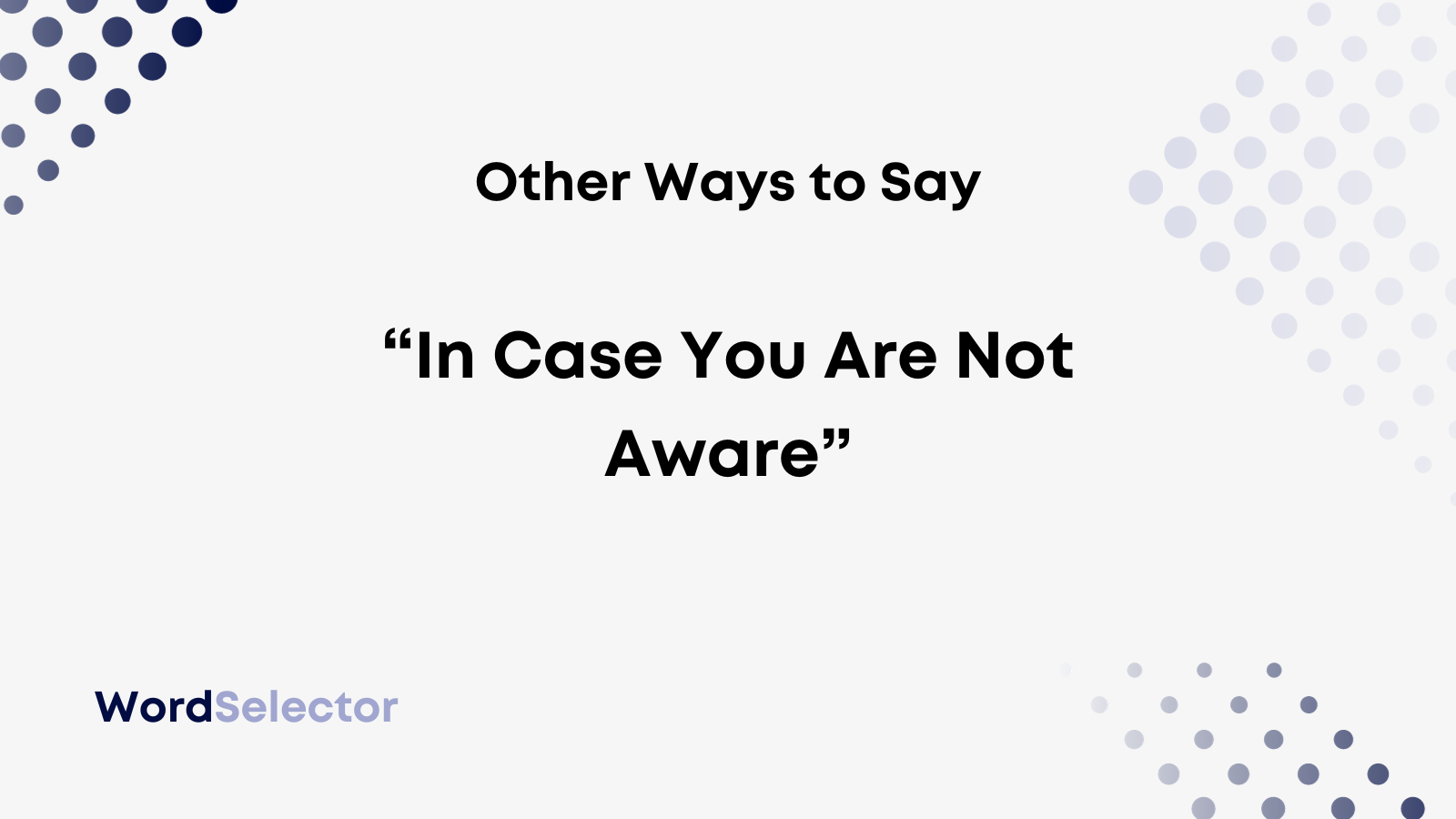So, you’re trying to share information with a peer, but you’re unsure if they already know it.
You might want to use “in case you are not aware,” but you’re worried that it’s repetitive, right?
Fear not!
You have options, and this article will talk you through them. We’ll teach you how to say “in case you are not aware” professionally and politely.
Other Ways to Say “In Case You Are Not Aware”
- If you haven’t been informed
- Just in case you haven’t heard
- If you haven’t already heard
- In case they haven’t told you
- I’m not sure if you’ve heard
- I’m not sure if you’re aware of this
- In the event that you are unaware
- If you aren’t in the know
- Should you be unfamiliar with the situation
- Forgive me if you already know
- I’m unsure if you’re aware
- In case this is news to you
KEY TAKEAWAYS
- “In case you are not aware” is a great phrase to include in an email before assuming someone knows something.
- “If you haven’t been informed” is a great formal synonym that shows you’re updating someone.
- “Just in case you haven’t heard” is great to use as a more informal synonym when updating a colleague.
So, read on to learn how to say “in case you are not aware” politely. We’ve touched on the best formal and informal options to help you keep things sincere.
Also, you can read the final section to learn more about the original phrase. We’ve explained whether it’s correct and when you can use it.
If You Haven’t Been Informed (Formal)
Another way to say “in case you are not aware” is “if you haven’t been informed.”
It’s great to use professionally, as it shows you don’t want to take someone’s knowledge for granted.
It suggests that you have a valuable update to share. However, it also suggests that you appreciate someone might have already heard the information from another party.
We recommend using it when emailing your boss. After all, it’s polite and respectful.
Therefore, it’s a great way to let your boss know you value them and their knowledge, and you don’t want to insult their understanding by assuming they don’t know something.
If you’re still unsure, check out this email example:
Dear Miss Rose,
If you haven’t been informed, our client has pulled out of the deal. What do you think we should do moving forward?
Yours
Karl Takamizawa
Just in Case You Haven’t Heard (Informal)
You should try “just in case you haven’t heard” as another way to say “in case you are not aware.”
We’ve kept “in case” in the phrase because it’s already an effective way to check if the recipient knows something.
However, this time, you can use “haven’t heard.” It suggests that someone else might have updated the recipient before you.
We like this one when emailing a coworker. It shows you’re happy to update them, but you’d also understand it if someone shared the news before you could.
We also recommend reviewing this example:
Dear Julio,
Just in case you haven’t heard, they’ve decided to bring the presentation forward by a few days. Will that work for you?
All the best,
George Jenkins
Is It Correct to Say “In Case You Are Not Aware”?
It is correct to say “in case you are not aware.” It’s polite to use it when updating someone about something they might already know about.
Also, it’s professional. So, it’s a good phrase to use in formal emails when you’re unsure whether someone might already have the information provided.
For example:
Dear Thomas,
In case you are not aware, they have moved the meeting to Tuesday. Will you still be able to attend?
All the best,
Dean Winters
As you can see, it’s a great way to update someone without taking their knowledge for granted.
It shows they might already know something, but you still want to update them just in case.
These extensions are also correct to use:
- Just in case you are not aware
- In case you are not aware yet
Including “just” or “yet” help to make the phrase slightly more informal and friendly. So, we recommend using the extensions above when contacting colleagues or people you like.
Finally, here’s a great variation to use:
- If you were not aware
Honestly, it doesn’t change much about the original phrase. Instead, it switches “in case” for “if,” which is a more streamlined way to show that you’d like to update someone.

